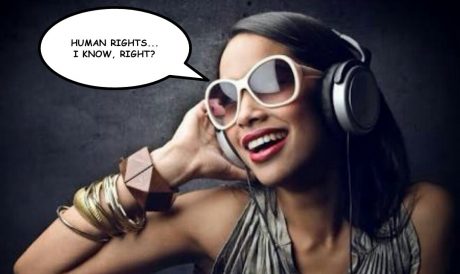
Whose side are Filipino “activists” on nowadays? From all the chest-thumping and fist-waving we are seeing all over social media and mainstream media nowadays, it would seem that the Philippines’ chattering classes are on the side of the crooks!
That is exactly how both President Rodrigo Duterte’s massive base of voters and the broader swathe of the Philippines’ crime-weary populace see it. The notion of “human rights” is, quite simply, just too sosyal for the average Filipino. It is the stuff spewed by iPad wielding hipsters sipping lattes and high-fivin’ each other at the local Starbucks.
Human rights? Lol! That’s an Imperial Manila thing.
You can almost hear the majority of Filipinos tap that out onto their social media apps whenever some high-brow “advocate” screams “Human Rights!” at the sight of the latest blood porn exhibited on the front page of the morning paper. Fact is, human rights have never been relevant to most people outside of Imperial Manila. It’s an abstract Western concept that doesn’t quite fit into the cultural narrative of Filipinos being “ingenious” at working around an untenable situation by cobbling together quick fixes.
Indeed, the most cherished cultural artefacts of Filipinos symbolise the celebrated ingenuity of our quick fixes. The jeepney, for example, has long been cited as a symbol of that “Filipino ingenuity” — a mechanical beast cobbled together from derelict US Army jeeps as a stopgap solution to a lack of modern public transport in the aftermath of the devastation of World War II. For several decades, Filipino triumphalists thumbed their noses at the more broadly-systematic public transport systems consisting of state-owned buses and trains that follow well-laid out routes on a clockwork-like timetable that the rest of the world built.
“Filipinos are great at ‘improvising’ on a shoestring budget!” these Pinoy Pride cheerleaders would say.
The thing with “human rights” is that it requires the same kind of legal engineering and clockwork-like justice system to work. The foundation of a society built on the notion of “human rights” consists of foresight, consistency, and scientific reasoning — all anathema to the Filipino cultural archetype. For the Filipino, human rights is, quite simply, too hard. Because a focus on “human rights” puts additional demand and a thick layer of complexity on a justice system, you need to have an efficient system in place to make “human rights” work. Unfortunately for the Philippines, its justice system is inefficient, snail-paced, opaque, selective, and, as a result, severely backlogged. Upholding “human rights” within such a system slows it down even more. And this is why shortcuts are appealing to ordinary Filipinos, because the majority of Filipinos lack the personal resources to navigate the mess that is the Philippines’ justice system in the spirit of “due process”.
And so the tragedy that is the Philippine “Human Rights” cause is that it was pitched the wrong way. It was not made relevant to the ordinary Filipino. The latte-sipping advocates of “human rights” in the Philippines are selling a Mercedes-Benz to a people who cannot even afford to keep a Toyota on the road.
Rightly or wrongly, Duterte’s “war on drugs” comes across like that fleet of jeepneys fielded to the Filipino commuting public in 1946. It addresses an urgent and immediate need. Ordinary Filipinos see it as a decisive move forward and a fresh approach following decades of imprisonment in a system that did not serve them well.
Much the same way that jeepneys, back in 1946, served a need but, at the same time, flouted modern notions of what a public transport system ought to be, the methods that Duterte allegedly applies to his “war on drugs” serves an immediate need even as it comes across as an affront to certain hipsters’ notions of what justice and law enforcement ought to be. Like it or not, that’s the Filipino Way in its truest essence. And this is why Duterte enjoys the trust and confidence of the majority of Filipinos as he sets out to get things done.
http://www.getrealphilippines.com/blog/2016/07/human-rights-advocacy-latest-fashion-statement-imperial-manila/

No comments:
Post a Comment